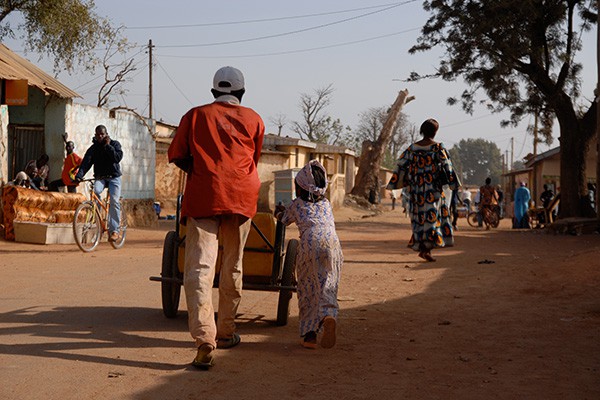



アフリカからのイメージの創造
ー映像人類学トロムソ学派の民族誌映画ー
2018 6.23 sat.
10:30–17:00 (Doors open at 10:00)
Film Screening & Discussion
Ethnographic Films
by University of Tromsø
トロムソ学派の民族誌映画の
上映・討論
2018 6.24 sun.
10:30–17:45 (Doors open at 10:00)
The Symposium
Visual Anthropological Studies
on Africa by Japanese Researchers
日本のアフリカ研究者の発表を
中心とするシンポジウム
- Venue: Seminar Room 7, 2nd Floor, National Museum of Ethnology (Minpaku)
- No reservations required.
※通訳はございません。
- 場 所:国立民族学博物館 第7セミナー室
- 参加費:無料
- 申 込:不要(定員60名)※先着順
映像人類学の脈絡においてアフリカの諸文化は、欧米の研究者に調査・撮影対象として一方向的に客体化され表象される傾向が強くありました。そのようななか、ノルウェー北部に位置するトロムソ大学映像文化研究科は、1997 年の設立以来、カメルーン、マリ、エチオピア、ブルキナファソ等のアフリカ各国から学生を迎え入れ、民族誌映画制作の実践を主軸とするカリキュラムのもと、多くのアフリカ人映像人類学者を輩出してきました。
6月23日:トロムソ大学映像文化研究科に所属、あるいは本研究科を卒業した映像人類学研究者による民族誌映画を上映します。
6月24日:日本のアフリカ研究者の作品や制作計画の発表を行います。
アフリカの様々な文化現象や社会問題に対する、カメルーン、ノルウェー、日本の人類学者の視点、映像のアプローチを比較検討し、議論します。
Ethnographic film practices of various kinds from across the globe are entwined with new forms of audiovisual expressions and approaches. These practices detach visual anthropology from its Western colonial legacy and expand the horizon of knowledge creation, storytelling and collaborative research in humanities. The aim of this meeting of anthropologists from Cameroon, Norway and Japan is to introduce Ethnographic films and research activities of the School of Visual Anthropology at University of Tromsø (UiT/Arctic University of Norway) that has been exploring the long-lasting research collaborations with scholars from African countries. We also present visual anthropological activities by Japanese anthropologists and identify prospects, and meet the challenges facing the image-making from/on Africa.
Ethnographic Films
by University of Tromsø
トロムソ学派の民族誌映画の上映・討論
-
Program
-
10:30- Welcome speech
Kenji Yoshida (Director-General, National Museum of Ethnology) -
Opening remarks
Itsushi Kawase (National Museum of Ethnology) -
10:45-12:30Trond Waage (University of Tromsø, UiT)
“Collaboration, Observational Cinema and Anthropological Knowledge - and a Film on Urban Migrants”
Chaired by Taku Iida (National Museum of Ethnology) -
 Screening & Discussion
Screening & Discussion
Les Mairuuwas – Master of Water
(60 mins, 2015, Trond Waage)
The film LES MAIRUUWAS’ portrays four men who have left harsh living conditions in The Central African Republic (CAR) and who lives the dream of succeeding in the city. The men portrayed, are among the thousands that annually comes from the CAR and other neighbouring countries to Cameroon searching a better life. The film describes in an observational style their daily struggles to make a living and create meaning in life.
- 12:30-13:30Lunch Break
-
13:30-14:45Rachel Djesa Issa (University of Tromsø, UiT)
“From Sorcery to the Study of Missionaries: Knowledge and Taking the Local Seriously”
Chaired by Isao Murahashi (JSPS/ASAFAS, Kyoto University) -
Screening & Discussion
Missionaries and Power
(34 min, 2002, Rachel Djesa Issa)
Since 1949, Maïdawa Thomas had the vision that his people, the Dii, would one day have the Word of God in their mother tongue. Since then, he dedicated all his life to translating the Holy Scripture. He translated the entire Bible, but instead of having a Bible in the Dii language, he remains rather with this declaration: "The work was well done, but, the application of this masterpiece is not for our times, it is for years to come.
-
15:00-16:30Mouazamou Ahmadou (University of Maroua)
“Institution Building through Collaboration on Filmmaking - Experiences Starting a Visual Anthropology Program in Maroua, Cameroon”
Chaired by Yushi Yanohara (CAAS, Kyoto University) -
Screening & Discussion
Juarke: Boys made Men in Mboum society
(60 min, 2010, Mohamadou Saliou)
The Mboum people have practiced male circumcision for decades. Until the middle of the last century, male circumcision was highly regarded as a period of initiation leading to a man’s status. Every year, children were sent to the buch and during their seclusion, cultural codes and knowledge of the community are given to them. Nowadays, this mode of knowledge communication has phased out. Therefore, very often, there are conflicts of generation between the older and younger generations especially those who were borned and raised far from thier community. By following a group of five children during their period of initiation, I show in this film how circumcision is practiced in this community. In spite of social changes and external pressures (urbanisation, modernity, HIV issues, etc), the effort and the will are there to make stable a social order resulting from this practice
- 16:45-Round table Discussion: collaborative filmmaking, one step further with all presenters above.
-
10:30- Welcome speech
Visual Anthropological Studies on Africa
by Japanese Researchers
日本のアフリカ研究者の発表を中心とするシンポジウム
-
Program
-
10:30-11:15Isao Murahashi (JSPS/ASAFAS, Kyoto University)
“Visual Images on Place-making of the Displaced: the Case of South Sudanese in Kakuma, Kenya”
-
11:15-12:00Yushi Yanohara (CAAS, Kyoto University)
“Being An Embedded Image and Sound: Musical/Visual Anthropological Research through Co-Creation of Music and Video with Hip-Hop Musicians in Cameroon”
-
13:00-13:45Hirohisa Fukuda (Ritsumeikan University)
“Visual Anthropology of Twa Cosmology, Rwanda’s hunter-gatheres”
-
14:00-14:45Itsushi Kawase (National Museum of Ethnology)
“Intangible Cultural Heritage and Filmmaking: the Investigation of Knowledge, Method and Politics Based on Case Studies from Africa”
-
15:00-16:15Daisuke Bundo (Shinshu University)
Screening & Discussion
Jo joko
(60 min, 2012, Daisuke Bundo)
This film is about the lives of hunter-gatherers, or you could say their ways of eating. They hunt what they can from surrounding nature, and then share for eating. In the tropical rainforest in Cameroon, the ethnic group called the Baka continues their traditional culture. In their language, they call food as "jo", and good as "joko" whatever the degree. This is an anthropological action film whose sole purpose is to simply record the mealtimes of people living in the forest.
Chaired by Martin Gruber (University of Bremen) -
16:30- Discussion with all presenters
Chaired by Rossella Ragazzi (Tromsø University Museum/ National Museum of Ethnology)
Trond Waage (University of Tromsø),
Rachel Issa Djesa (University of Tromsø),
Mouzamou Ahamadou (University of Maroua),
Martin Gruber (University of Bremen)
-
10:30-11:15Isao Murahashi (JSPS/ASAFAS, Kyoto University)


